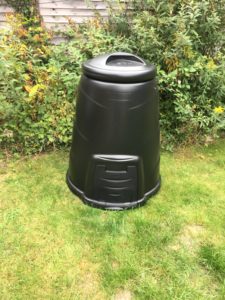Composting is not just about gardening – it helps the environment too. Keeping waste out of the dustbin saves all of the cost and energy associated with the collection of the material. Digging the compost back ito the garden completes the carbon cycle and can help to offset your emissions. So let’s put this valuable resource to use, help your garden and get composting!

Compost bins can be obtained from most home and garden shops, or using the Sustainable Silchester group purchase scheme (contact us for details).
Place your composter in a sunny spot onto well-drained soil. It can be placed onto concrete or other solid surface, but place a layer of soil beneath it.
Loosen soil beneath the compost bin in order to help drainage and to make it easier for worms and bacteria to eneter the bin from the earth surrounding it.
It is essential to have a good mix of waste material in your compost bin to aid decomposition.
Add different types of material in layers approximately 7-15cm deep. You can compost:
- Vegetable and fruit peelings
- Tea leaves. coffeee grounds and crished egg shells
- Grass cuttings (some is great as it’s a natural activator, but avoid using too much)
- Hair
- Animal manure (from vegetarian animals such as guinea pigs). Best mixed with straw.
- Vacuum dust – the contents of a vacuum cleaner sack compost well, particularly if you have woollen carpets. Do not try and compost if you have primarily synthetic carpets as this will not breakdown.
Add Sparingly to your compost bin
- Evergreen clippings – they take a long time to decompose and should be added only in small amounts
- Leaves – contain lignin and take a long time to decompose, the same as wood. best dealt with separately in leaf mould piles
- Prunings – only add in small amounts andd chop up well
- Paper (in small amounts, shredded or scrunched up)
Things to Avoid
- Disposable nappies or used paper hankies (in case the pathogens that cause disease aren’t all destroyed by the composting process)
- Excrement – human/cat/dog (for the same reason)
- Hard objects, stones, bits of glass, metal, plastic
- Cleaning fluids and other household/garden chemicals
- Meat (cooked or raw) – the smell can attract animals
- Fish and dairy products are not recommended
Getting the Best Results
- Activators such as grass, nettles, pond weed, comfrey, urine, horse, cow, sheep, pig and pigeon manure and rabbit or guinea pig droppings help speed up the composting process. This is particularly useful during the cold winter months
- Always keep the lid on your compost bin – it retains heat and moisture when the weather is dry and protects it when it rains
- Site it out of the wind, as you need a fairly high temperature in your compost bin
- Do not let it dry out. Add water when necessary in very dry hot weather.
- The compost is ready when it is brown and crumbly. This takes 9-12 months.
Frequently Asked Questions
Will my Compost Bin attract Rats?
Living in the countryside, there are already rats around. Rats are more likely to visit your compost bin if it is a source of food, so avoid adding cooked foods, dairy products, meat, fish, or bones. Regularly used compost bins are much less likely to attract rats. if you are concerned, then try placing some chicken wire, or heavy gauge mesh under your bin to stop them getting in.
Why do I get a lot of ants in my bin?
Ants are part of the home composting process, but it could mean that your bin is too dry. For a quick fix, add some cold water to your bin. Over time, you may need to add more ‘green’ nitrogen rich items such as grass cutting and vegetable peelings to keep moisture levels up.
Why does my bin smell?
You need to add more oxygen in your compost bin so that the waste can break down aerobically. By mixing bulky items such as toilet roll tubes, cardboard or shredded paper into your bin you can introduce pockets of air.
I seem to have a lot of small black flies in my compost bin?
Fruit flies do not carry disease and do not harm your compost. However if you find them unpleasant you can reduce their numbers by ensuring that the organic waste destined for you bin is always kept covered in the kitchen or whereever it is stored. You can eradicate them by leaving the lid off the bin for 3-4 days allowing predator beetles to gain access and kill them for you and by covering the compost with an inch or so of soil to prevent the hatching flies from being able to escape. They are not an indicator of a failing bin.
I’ve waited a while but I still don’t have any compost at the bottom of my compost bin. Why is this?
It takes 9-12 months to make finished compost. Keep adding a good balance of greens and browns and the creatures will keep composting everything down.